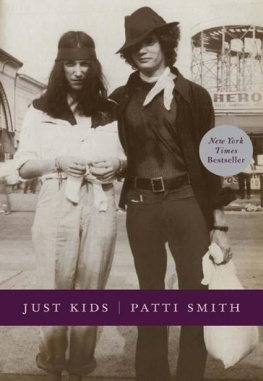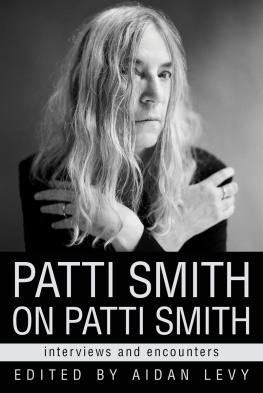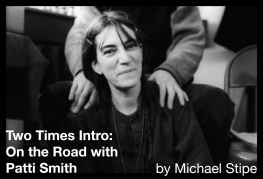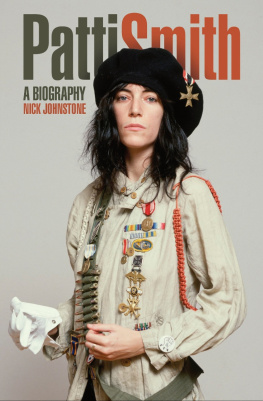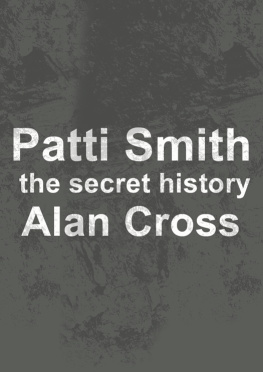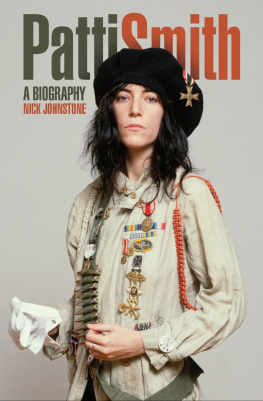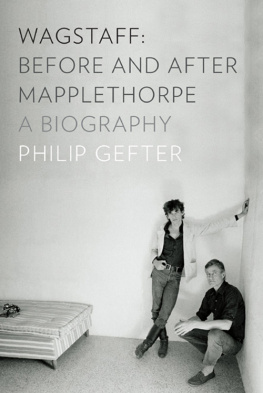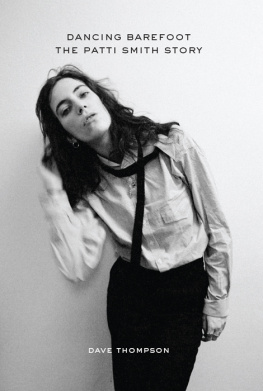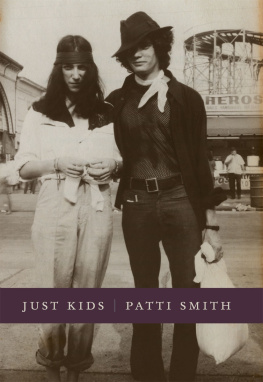Just Kids - Patti Smith
Here you can read online Just Kids - Patti Smith full text of the book (entire story) in english for free. Download pdf and epub, get meaning, cover and reviews about this ebook. year: 2008, publisher: Ecco, genre: Non-fiction. Description of the work, (preface) as well as reviews are available. Best literature library LitArk.com created for fans of good reading and offers a wide selection of genres:
Romance novel
Science fiction
Adventure
Detective
Science
History
Home and family
Prose
Art
Politics
Computer
Non-fiction
Religion
Business
Children
Humor
Choose a favorite category and find really read worthwhile books. Enjoy immersion in the world of imagination, feel the emotions of the characters or learn something new for yourself, make an fascinating discovery.
- Book:Patti Smith
- Author:
- Publisher:Ecco
- Genre:
- Year:2008
- Rating:4 / 5
- Favourites:Add to favourites
- Your mark:
Patti Smith: summary, description and annotation
We offer to read an annotation, description, summary or preface (depends on what the author of the book "Patti Smith" wrote himself). If you haven't found the necessary information about the book — write in the comments, we will try to find it.
Amazon Best Books of the Month, January 2010: Patti Smith and Robert Mapplethorpe werent always famous, but they always thought they would be. They found each other, adrift but determined, on the streets of New York City in the late 60s and made a pact to keep each other afloat until they found their voices--or the world was ready to hear them. Lovers first and then friends as Mapplethorpe discovered he was gay, they divided their dimes between art supplies and Coney Island hot dogs. Mapplethorpe was quicker to find his metier, with a Polaroid and then a Hasselblad, but Smith was the first to fame, transformed, to her friends delight, from a poet into a rock star. (Mapplethorpe soon became famous too--and notorious--before his death from AIDS in 1989.) Smiths memoir of their friendship, Just Kids, is tender and artful, open-eyed but surprisingly decorous, with the oracular style familiar from her anthems like Because the Night, Gloria, and Dancing Barefoot balanced by her powers of observation and memory for everyday details like the price of automat sandwiches and the shabby, welcoming fellow bohemians of the Chelsea Hotel, among whose ranks these baby Rimbauds found their way. --Tom Nissley
From Publishers WeeklyStarred Review. In 1967, 21-year-old singersong writer Smith, determined to make art her life and dissatisfied with the lack of opportunities in Philadelphia to live this life, left her family behind for a new life in Brooklyn. When she discovered that the friends with whom she was to have lived had moved, she soon found herself homeless, jobless, and hungry. Through a series of events, she met a young man named Robert Mapplethorpe who changed her lifeand in her typically lyrical and poignant manner Smith describes the start of a romance and lifelong friendship with this man: It was the summer Coltrane died. Flower children raised their arms... and Jimi Hendrix set his guitar in flames in Monterey. It was the summer of Elvira Madigan, and the summer of love.... This beautifully crafted love letter to her friend (who died in 1989) functions as a memento mori of a relationship fueled by a passion for art and writing. Smith transports readers to what seemed like halcyon days for art and artists in New York as she shares tales of the denizens of Maxs Kansas City, the Hotel Chelsea, Scribners, Brentanos, and Strand bookstores. In the lobby of the Chelsea, where she and Mapplethorpe lived for many years, she got to know William Burroughs, Allen Ginsberg, Jimi Hendrix, Janis Joplin, and Johnny Winter. Most affecting in this tender and tough memoir, however, is her deep love for Mapplethorpe and her abiding belief in his genius. Smiths elegant eulogy helps to explain the chaos and the creativity so embedded in that earlier time and in Mapplethorpes life and work. (Jan.)
Copyright Reed Business Information, a division of Reed Elsevier Inc. All rights reserved.
Just Kids: author's other books
Who wrote Patti Smith? Find out the surname, the name of the author of the book and a list of all author's works by series.

